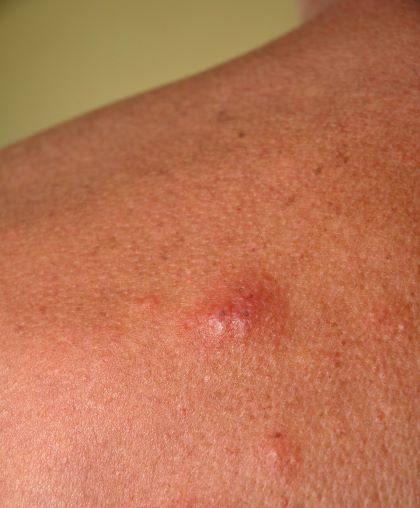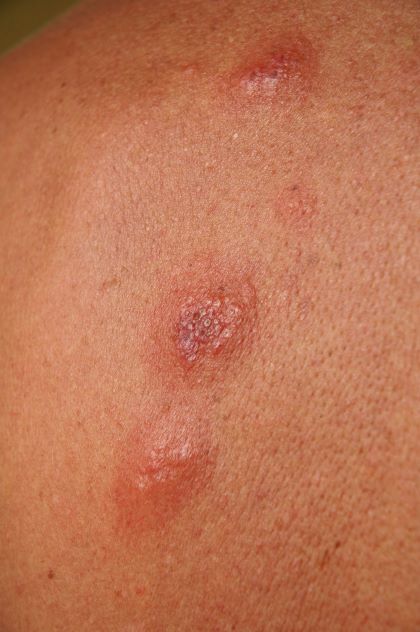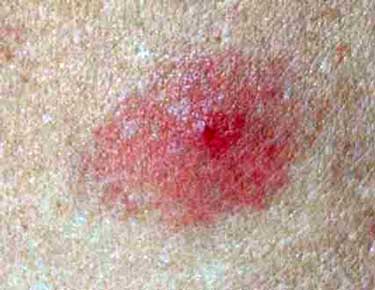- Home
- Dog Fleas and Ticks
- Flea bites on humans and dogs
Flea Bites On Humans And Dogs
Flea bites on humans and dogs are annoying and painful; if not treated, they can become infected and cause complications!
Learn how to recognise and treat dog flea bites, and get rid of your dog's fleas fast!
How to Recognize Dog Flea Bites
...On Humans
Three main types of fleas infest humans; dog fleas, cat fleas, and then there's the human flea.
 Dog flea bites on my husband's back!
Dog flea bites on my husband's back!You'll usually find a few bites clustered together (or in a line) around the ankles, legs or feet.
However, fleas aren't fussy about where they dine; they can bite pretty much anywhere, especially if you allow your Cocker Spaniel to sleep on your bed!
When a flea bites, it releases an enzyme (an anti-coagulant which ensures that the blood flows freely) which causes inflammation, irritation, and lumps or blisters.
The bites usually start as small red spots, hardly noticeable...until they itch and you begin to scratch them.
That's when the problems begin. After scratching, the area around the bite becomes a pinkish red, and the centre can darken slightly and may swell and/or bleed. If you look closely, you'll see the puncture wound in the centre of the bite where the flea pierced the skin.
As well as irritation and infection, dog fleas can also transmit serious diseases such as bubonic plague and typhus.
...On Dogs
Fleas can also pass on tapeworms if the flea carries them, so keep an eye on your dog's stool. If you see any indication that your dog may have tapeworms (or any type of worms), make an appointment for your Spaniel to see his vet.
In severe cases, your dog may become anaemic due to blood loss. This anaemia may cause lethargy, weakness, weight loss, pale gums, and breathlessness.
Additional symptoms of bites from fleas are set out below.
Symptoms of Flea Bites on Dogs
If your Cocker Spaniel is unlucky enough to pick up these unwelcome parasites, you'll soon know about it. Here are some signs that your dog may have fleas:
- He'll become somewhat preoccupied with his grooming as he tries to get rid of the fleas, nipping, biting and licking himself, particularly near the end of his tail.
- He'll probably do a lot of frantic scratching, which could lead to the bite(s) becoming infected.
- You may see tiny red marks or lumps on his skin, similar to flea bites on human skin.
- If you look at his coat closely and see tiny black specks, like small coffee grounds, it's likely to be dried blood. If you place a sample onto a sheet of white paper, add a drop of water, and the grains turn red - bingo, your dog has fleas!
- If your Spaniel is unlucky, he may have an allergic reaction to the bites (or flea debris) and could begin to lose patches of hair as a result.
- The bites may cause him some pain if they become infected, and depending on how sensitive your dog's skin is more intense itching.
Amazingly, such tiny insects can cause many problems for you and your dog! If you'd like to know more about bites from fleas, you'll find some good information on this site.
Treating Flea Bites
Treating Bites On Humans
One of the best treatments for a flea bite is not to scratch, but as this is an almost automatic reaction to a bite, I won't even go there!
 Another example of severe reactions to bites from dog fleas!
Another example of severe reactions to bites from dog fleas!First of all, clean the area with an antiseptic soap or liquid.
The bites may be treated using products bought over the counter, such as:
- Antihistamine cream;
- Hydrocortisone cream;
- Benadryl cream;
- Calamine lotion;
- Aloe-Vera gel;
- Any other lotions or creams specially formulated for bites;
- An ice pack.
A paste of baking soda and water is also said to alleviate the symptoms of bites.
If, after two or three days, none of the above seems to be working, or your bites appear to be worsening, it's probably advisable for you to visit your doctor.
This photo shows a severe reaction to being bitten by fleas after allowing the dog (complete with fleas) to sleep on the bed.
In most cases, flea bites don't necessitate a visit to the doctor.
However, you should be aware that fleas often carry tapeworms. You won't know whether or not you have tapeworms until you see the obvious signs in your stool, in which case you will need to see your doctor.
 A dog flea bite on human skin
A dog flea bite on human skinTreating Bites On Dogs
Flea bites can be annoying and can make your dog's life miserable.
If the bite on your dog's skin is red and itching a little, depending on the severity, all that may be needed is a little Aloe-Vera to calm the area.
If it's inflamed or doesn't improve with the Aloe-Vera, you may need to discuss this with your vet.
As for killing fleas and preventing further infestations, you can buy many effective treatments online or at pet shops. However, you may need to obtain a prescription from your vet for some products.
Getting Rid of Dog Fleas
To keep those flea bites at bay, you'll need to eliminate those pesky critters!
They can be challenging to get rid of, so giving your dog an effective flea treatment each month is essential.
Don't just rely on flea treatments, though. Check your pet often. I inspect Max's coat each evening when he's lying quietly, but I also look closely every time I see him scratch!
Because our Cocker Spaniels are usually the culprits for flea infestations in the home, it's essential to get rid of fleas from your dog first. Make sure his sleeping area is spotless, and wash his bedding regularly.
Next, treat your home. Vacuum carpets and rugs every day for at least 10 days or until there are no more fleas; otherwise, you'll continue to have unwanted lodgers for many months.
You can learn how to get rid of fleas on your dog here and get rid of those annoying parasites for good!
Photo credit for Flea Bites on Humans and Dogs:
All photos on this page are copyright of About Cocker Spaniels


